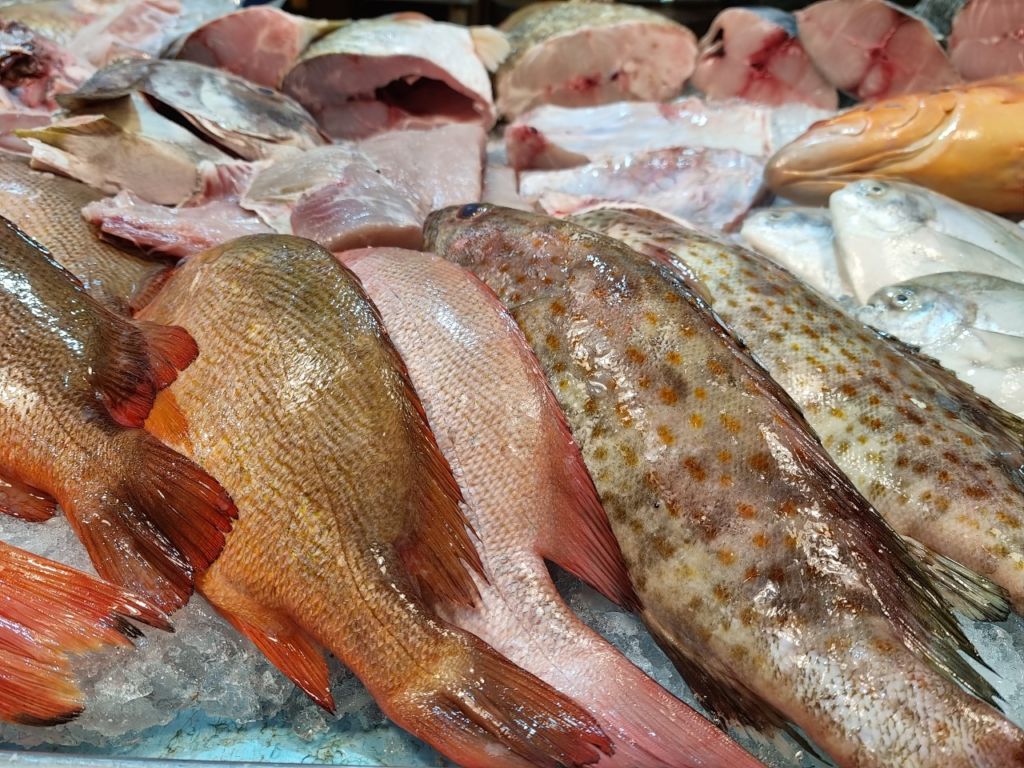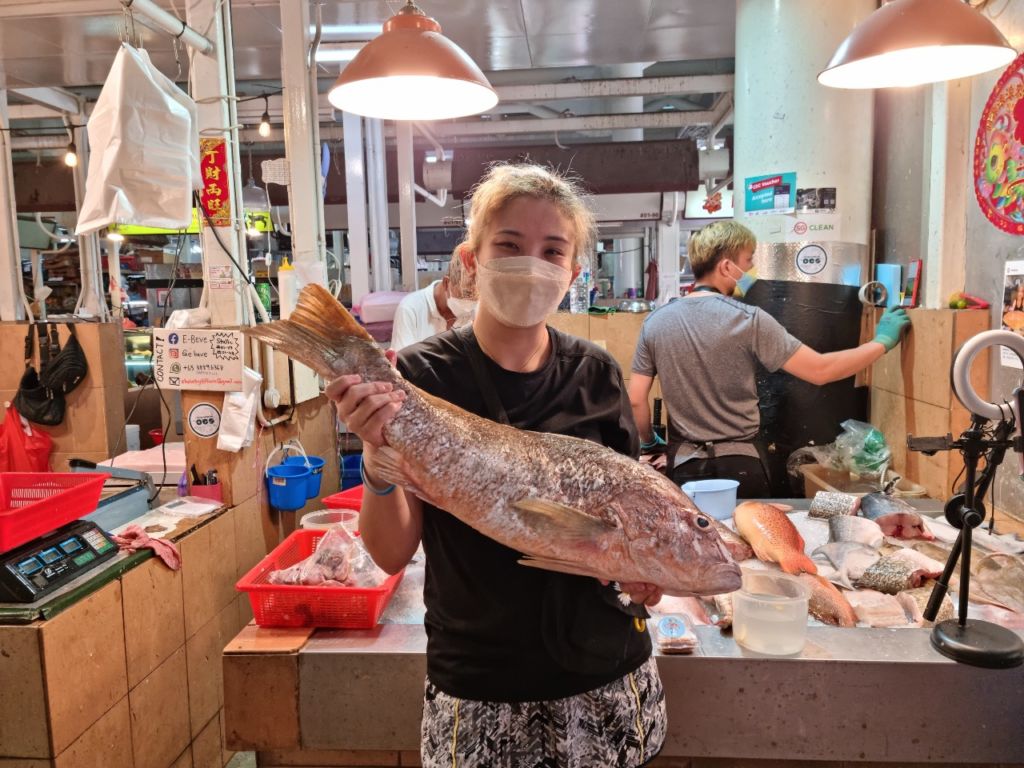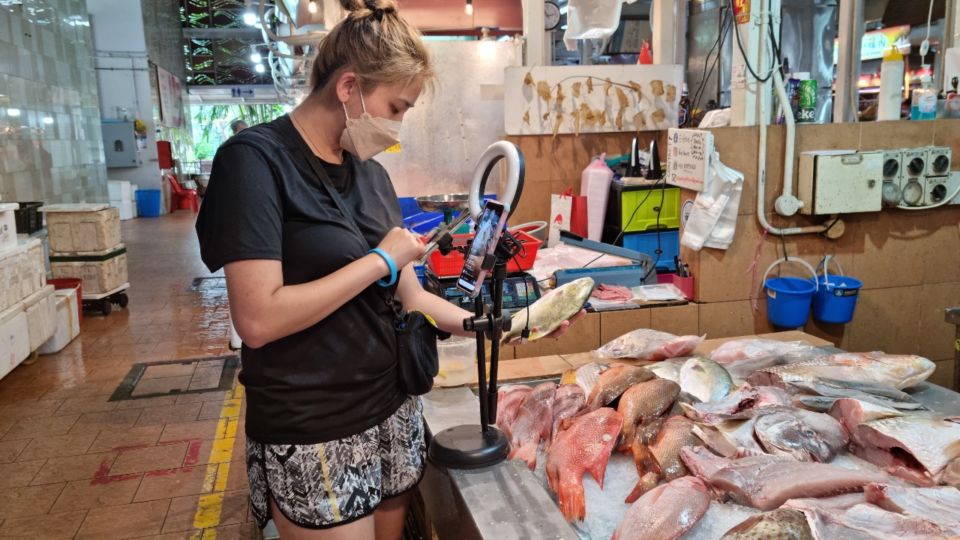When it comes to jobs, many Singaporean millennials prefer corporate life. But not Tiffanie Beve Sio, who has traded a suit for fish gut-stained tees, all thanks to the pandemic.
While the life of a fishmonger might not be as fancy as that of a stockbroker, a career the 28-year-old left behind last year as the COVID-19 crisis froze hiring, her business pays and feeds her love of fish, she said.
“I technically have all sorts of seafood that I can any day, choose what I want to eat, you understand what I mean?” the seller said in Singlish in a recent interview. “I don’t even have to go and catch for it, that’s the best. […] I can get it at supplier rate.”
Sio runs her business, E-Beve, with her cousin and boyfriend, who struggled to find a job after quitting the army last year. She started out selling sundries and durian to a live online audience from her home while in the middle of the “Circuit Breaker” partial lockdown. The business then evolved into a full-fledged virtual seafood auction out of a wet market near Novena.
Every day, customers tune into her Facebook page for first dibs on the day’s freshest catches. They include everything from crab to Norwegian trout and Batang, aka Spanish mackerel. Despite complaints from her mother, who insists she return to the corporate world, Sio contends that her new career is “less mentally stressful” and pays more than previously. She used to earn up to S$5,000 a month.
“Why the hell would I want to do this kind of job if I can earn the same as normal office hours,” she said in a video call from her home.

Sio said that she was forced to move her business out of her home after persistent complaints from her mother, who was annoyed by the mess in the kitchen, where she used to gut and package her seafood orders. After seven months, she found two adjacent stalls at the Pek Kio Market, strategically located in central Singapore, where her orders can be delivered to customers by dinner time.
“The most affordable place without having to break the bank is [the wet] market,” Sio said. Rent costs less than $500 a month for both spaces.
She added: “[…] whatever that you all order, I guarantee you it’s fresh that day. I will process [on] that day, you will receive [on] that day as well, before you even have to cook dinner.”
Sio and her boyfriend were not the only ones who lost their jobs last year. The Manpower Ministry reported its sharpest decline in employment in two decades as the pandemic disrupted most sectors, especially tourism.
“If you ask me whether there’s a transition between my old job and [the current one], don’t have,” she said, adding: “I got no money, I just did what I did but then I transitioned the entire job to sell something that I like.”
After graduating from the Lasalle College of the Arts where she studied broadcast media, Sio became an insurance agent and later a stockbroker. She quit her job and had three job interviews, canceled by potential employers due to COVID-19 movement restrictions in mid-2020.
As many Singaporeans adjusted to working from home, Sio decided to take a break for a month and spent most of her time with her boyfriend. Her cousin later urged her to work as a durian seller, paving the way for her career in live selling.

‘My parents were shocked’
Her decision to become a full-time fishmonger shocked her parents, who were already against the idea of their daughter selling fish via live streaming. They asked her questions like, “Didn’t you say that you were only doing this for a while?” and “Then what’s the point of studying so much?”
“I said [to my mom]: ‘You don’t need to worry.’ I say that ‘if within one year okay, things don’t work out, I promise I [will] go back to work at [a] office job,’” Sio said.
It is rare to see younger people working at Singapore’s wet markets, where vendors are usually middle-aged men. So it didn’t surprise Sio and her boyfriend when they drew stares from other sellers at Pek Kio Market. In Singapore, female fishmongers are generally seen as uneducated or forced to make a living by circumstances such as an unplanned pregnancy.
“A lot of aunties and uncles, including our customers and the neighboring stall owners, […] they are just, number one, very shocked that we are very young, number two, is like they will ask us […]: ‘Why do you guys want to work in the wet market? Is it because you guys are not educated?’” she said.
Meanwhile, her friends have supported her career change and buy seafood from her, she said. Sio also thinks that a career in selling fish can withstand economic and pandemic disruptions.
“Pandemic proof, recession-proof, everybody needs to eat … be it whether a pandemic, be it a recession, … there is good business, there is bad business but it’s still business, it is still earning money,” she added.
Other stories:
Curry conundrum: For Indian renters, Singapore’s racism starts in the kitchen
Analog allure attracts Singapore’s digital-weary photographers – and sets camera market on fire




